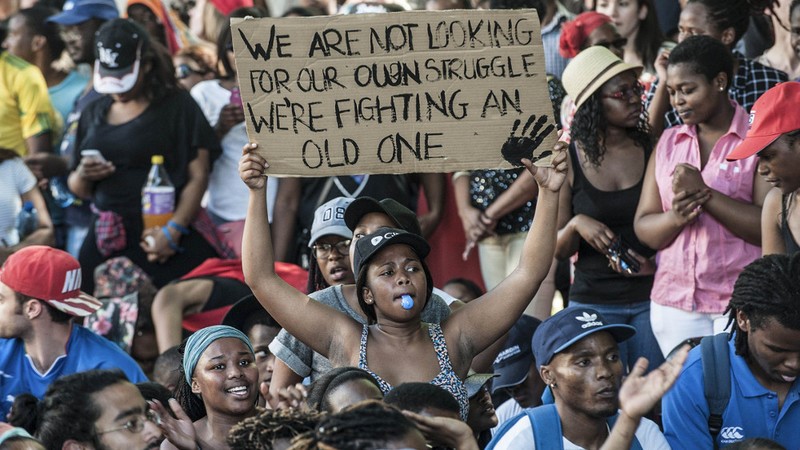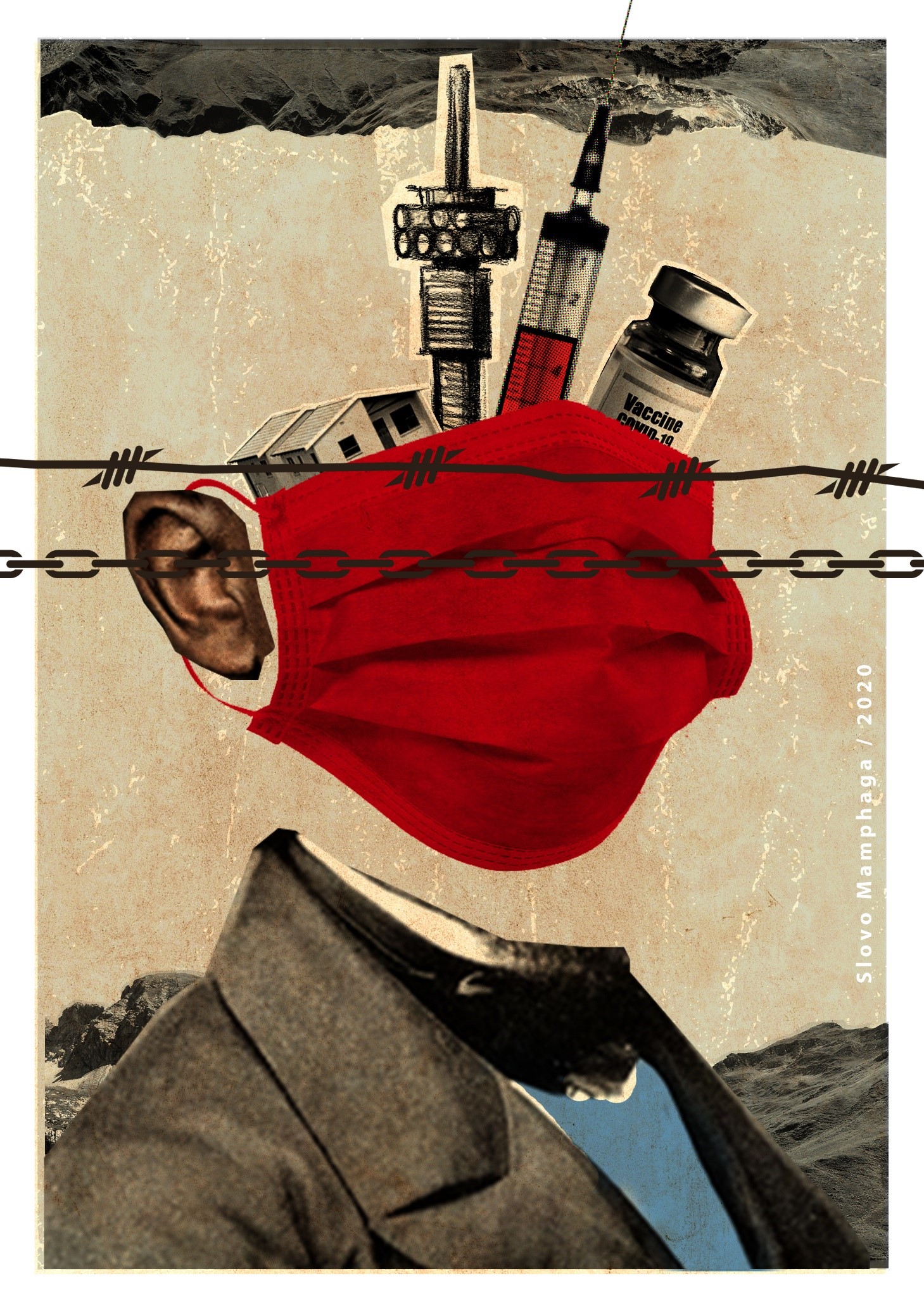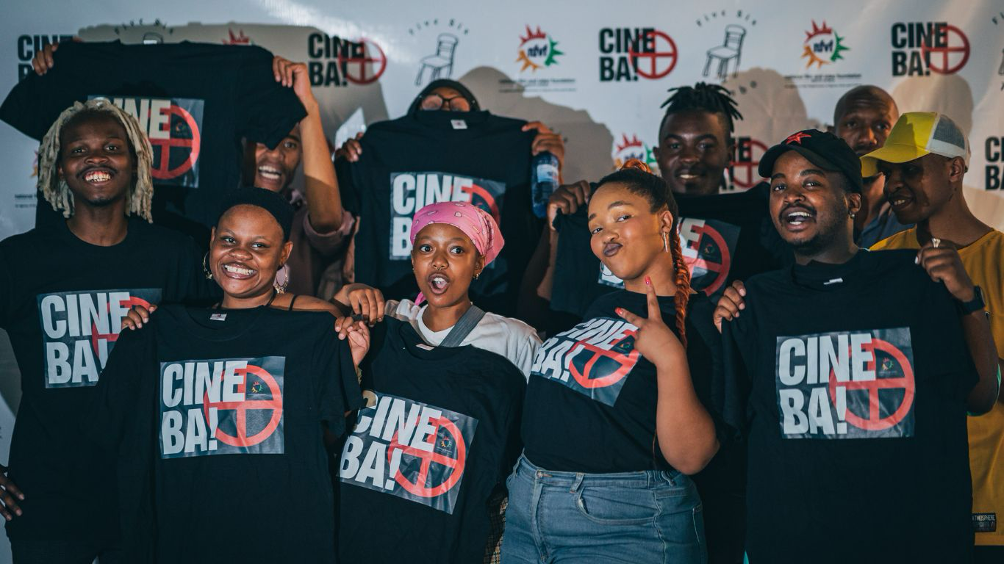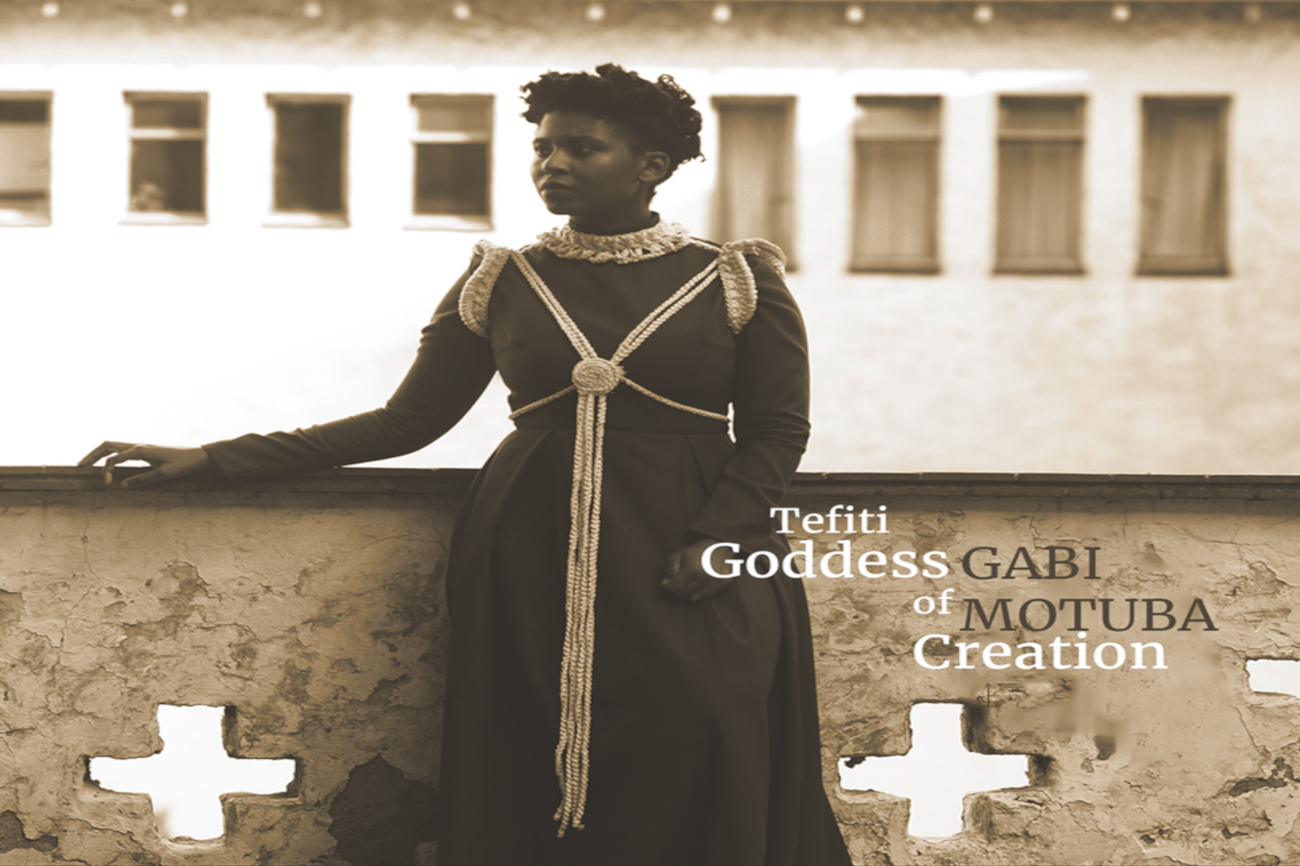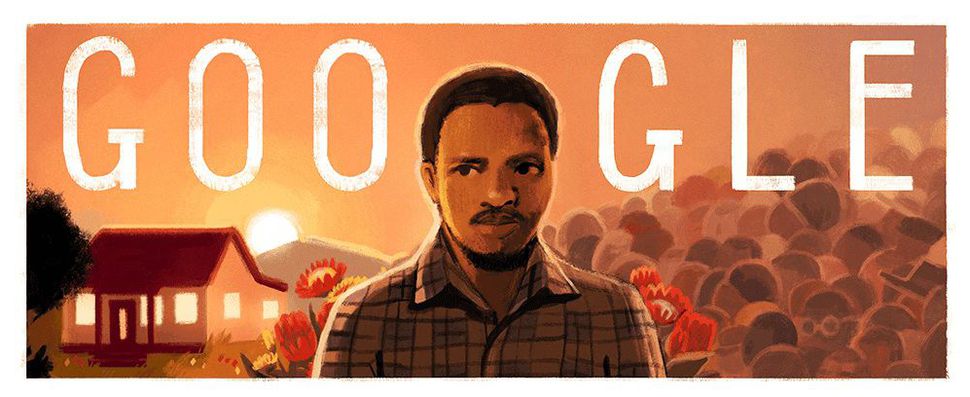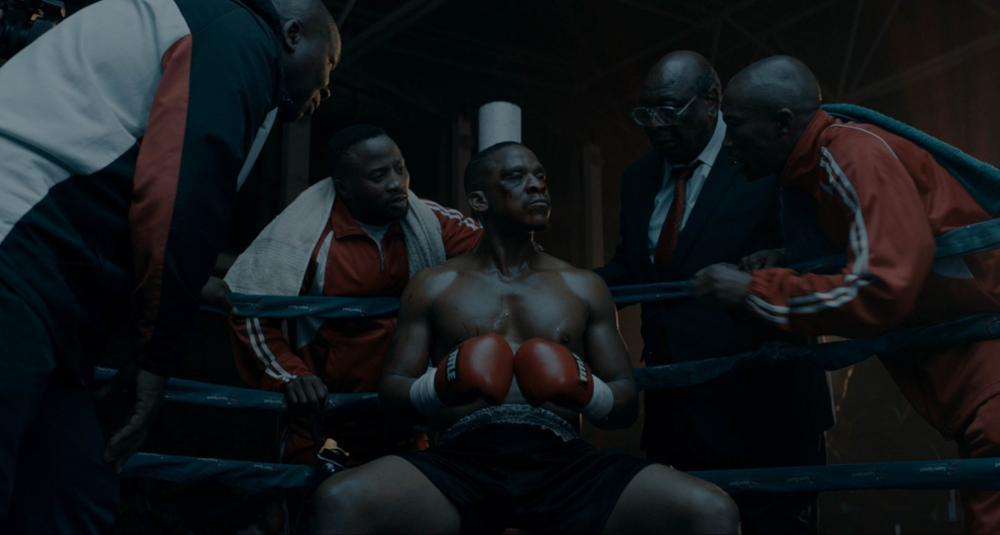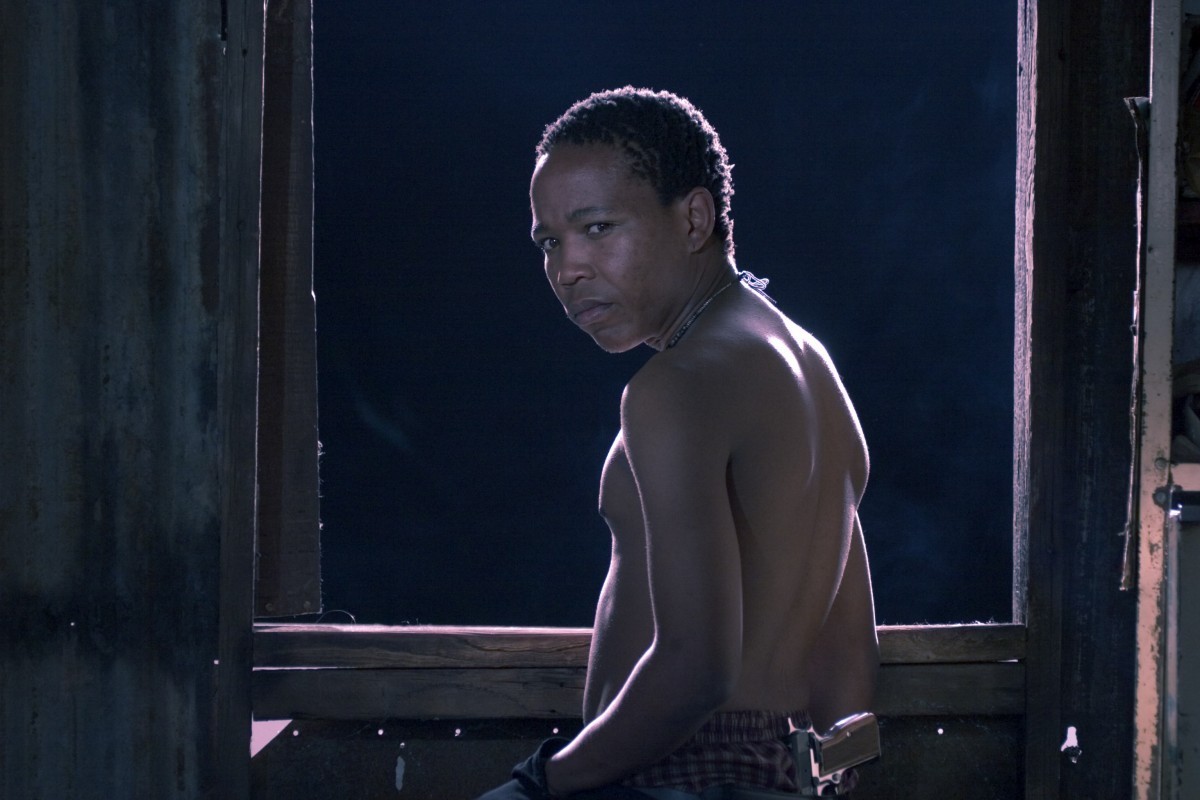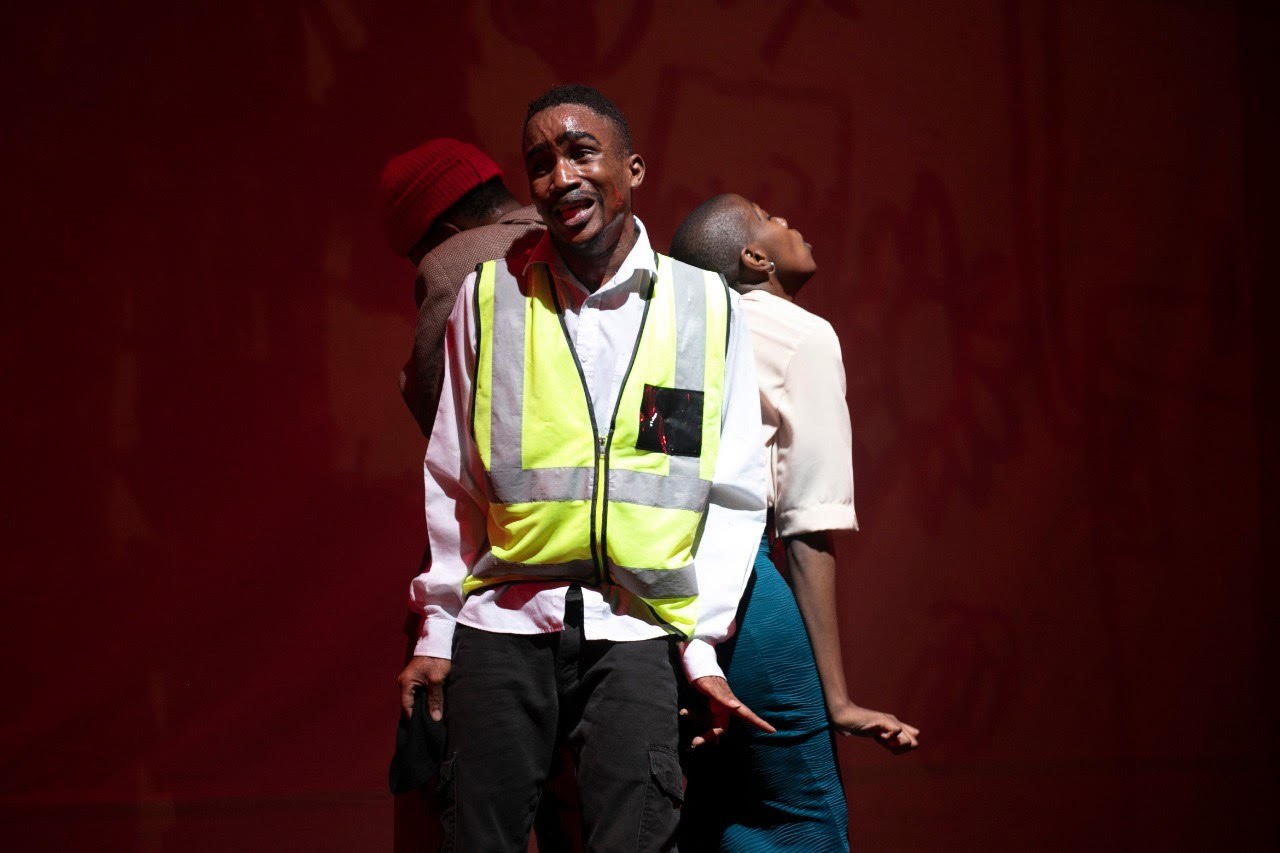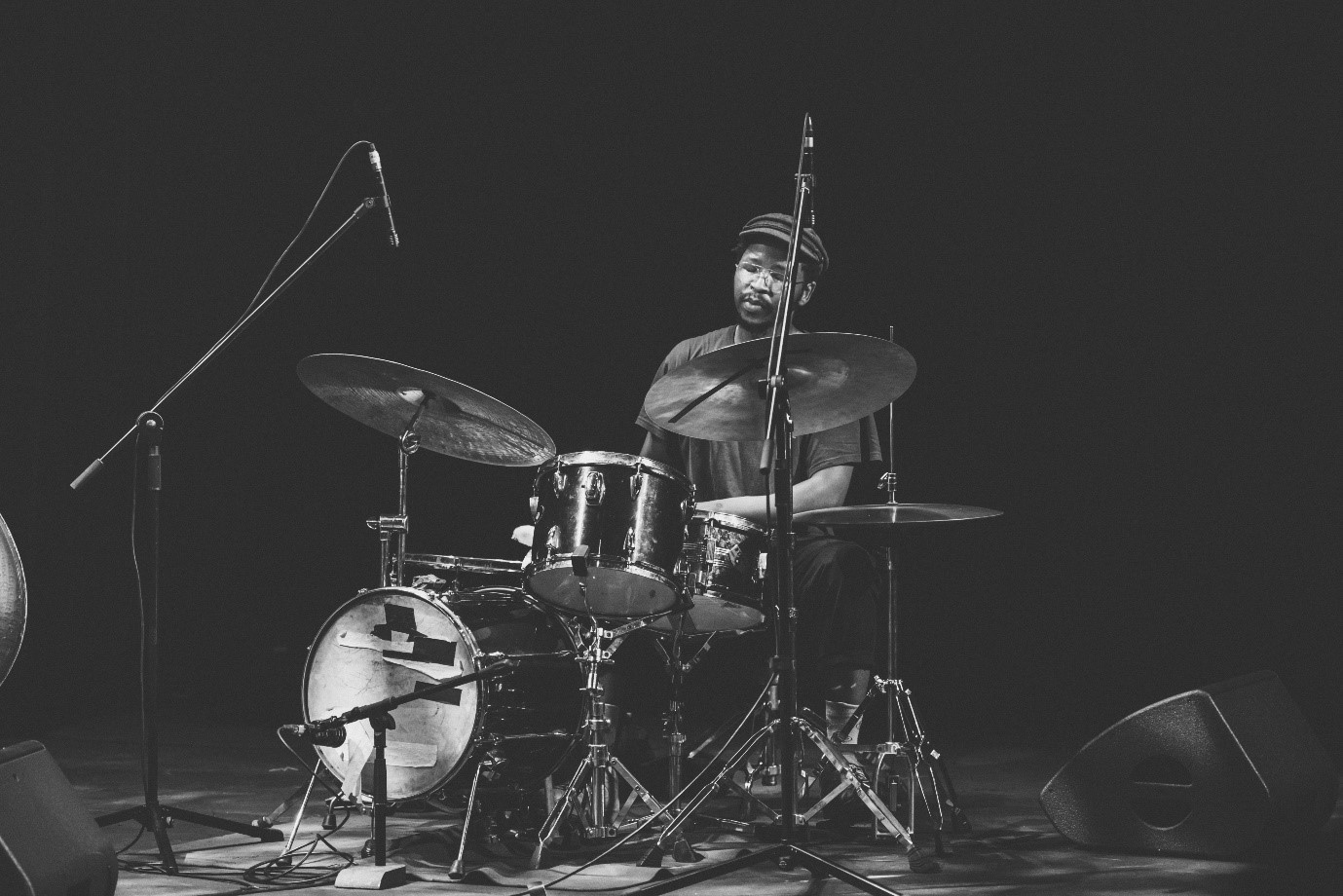On the 16th of June 1976, Hector Zolile Peterson, 12 years old, boisterously walked to school with the confidence of a child, certain within himself that society owed him a future; a bright future. It was a future he had written several letters to, had held several conferences with, a future to which he had sent numerous messages about his wish to become a doctor, a teacher, a university professor, perhaps a mechanic. Every time he sat alone in that abandoned scrap car that seemed, always, invitingly ready to cart him to his future destination, as he keenly negotiated the imaginary curves of his life, adroitly swerving the steering of the car to avoid the many pitfalls with which his road was laden, his wish for a future career morphed without changing. There was no difference, whether he arrived in the future as a teacher, a doctor, a university professor, or a mechanic. It mattered little for it meant one and the same thing, he assured the world about him. He resolutely assured the many fellow Black people he encountered on the road, who bothered, as a matter of duty, to inquire about his well-being; a well-being they knew was equally and inseparably theirs, that the future would be better. That future he mused about would be unlike that of his parents, unlike that of the multitudes of Black people on whose faces was written destitution, for whom white people had decided that beer halls (alcohol and cigarettes) were much more desirable than hospitals (health) and schools (education).
Because the world had, through its intuitive force, communicated to him its guarantee that the future he longed for awaited him only if he marched through life upright, with courage and determination, and so he walked undeterred every day to school. Because each walk to school was a cherished moment to commune with that future he yearned for, he refused the demoralising poverty (which white people had inscribed on his body and of those like him), and its intended effects. Hunger, felt on many a cold winter morning school day, its wrenches made even more intolerable by inadequate clothing on a young tender body, failed to break his spirit. On the 16th of June 1976, he walked upright, with the same courage and determination. Together with thousands of other hungry Black children, they marched in defence of their right to imagine a future for themselves, in their land. Unexpectedly, his sister surfaces from a house where she had been hiding, pulls Hector away from the march, asks him; ‘What are you doing here’? Driven by the concern older kin owe to those younger, she tries to dissuade him from continuing to show fellowship with other marchers; with such conspicuous indifference to danger. Hector Zolile Peterson is 12 years old; he has neither the time nor words to formulate his response. But he hears the future he had made a pact with pray him not to betray it. He does not dither. Looks at his sister for a moment, jerks free from her words and runs to rejoin the march. Moments later, white people shoot and kill him. Regrettably, he does not keep his appointment with the future; but by that same act of dying, he bequeaths unto us a gift.
When given with good intent, a gift is a sign of meanings, and its real value lies beyond the thing itself. A gift – anthropologists who have studied gifting/gift giving know – initiates the giver and the one who receives it into an oath, an oath to be faithful to the gift’s symbolic meaning(s); friendship, life-long companionship, shared revolutionary morality, etc. It is for this reason that I must beg you to remember and never forget that the gift Hector Zolile Peterson leaves for us, the blood that gushes from the gunshot wounds inflicted upon his body, clears the path for us, the Black colonized, on which today we walk from our respective homes to UCT. It is his phantom-like limbs that dangle as Mbuyisa Makhubu carries his lifeless tender body frothing at the mouth with blood, which push open the gates, the doors of lecture halls – and unlocks the offices for us the Black colonized to walk in. If this is the gift, or symbolic meaning of the gift we have openly embraced from Hector Zolile Peterson, there is however another to which we have conveniently turned our backs. One much more significant, and I wince as I say so.
On the 16th of June 1976, Hector Zolile Peterson was 12 years old when white people shot and killed him. Nothing compelled him to join the march. He could have opted to stay at home, could have professed not to like politics, could have claimed to be young, could have pleaded indifference. All these and more were options and rationalisations available to him. But he chose not to. What urged him otherwise? It is in the answer to this question that we edge closer to that other symbolic meaning of the gift from Hector Zolile Peterson’s life-in-death, to which we have elected to respond with benign neglect. The answer, simply put, is that Hector Zolile Peterson, despite his tender age, had accepted the responsibility – which since the advent of modernity behooves upon the Black colonised and enslaved peoples – to contemplate the meaning of freedom, to stitch together in thought an idea of freedom, to enact in their politics this conception of freedom, suffusing their daily interactions and existential reality with acts that are an undeniable evidence of their will to be free. Such freedom surely cannot be extrinsic, outside of one’s consciousness, and separable from one’s everyday life relations. Hector Zolile Peterson also knew that so expansive an idea of freedom could not be contained in or reduced to words within the pages of statute books. In Hector Zolile Peterson’s life-in-death is both an exemplar and an invitation. His dangling, life-less limbs beckon us to that act of contemplation, contemplating in earnest what it means in the present to be free as a Black person – in a settler colonial society – and to accept the consequences thereof.
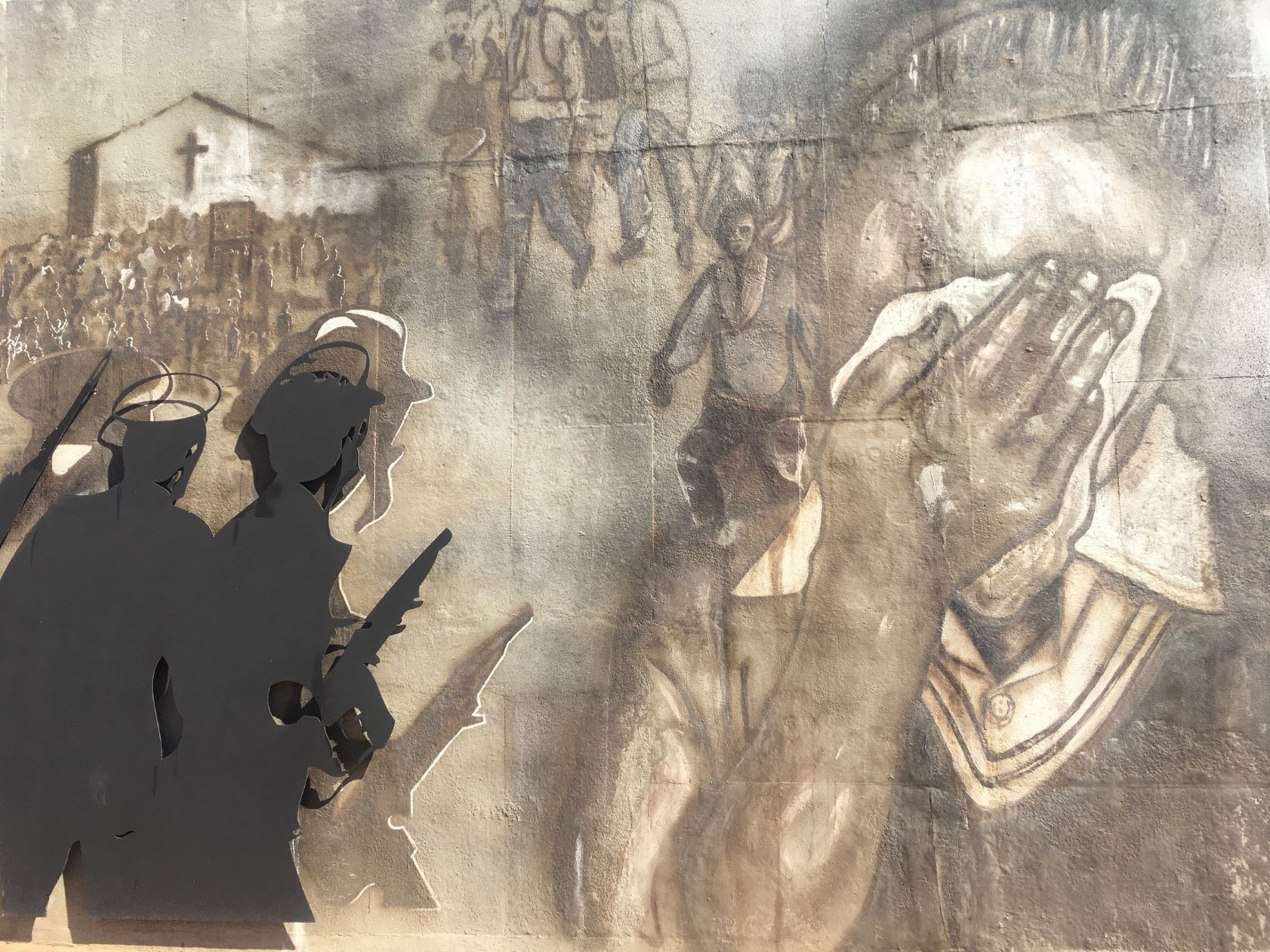
I beg you to re-examine again the picture of that life-less body of Hector Zolile Peterson in Mbuyisa Makhubu’s arms. Inscribed on it is a surfeit of meanings. It is the following that forces itself to our reckoning as the Black colonised in a settler colonial society: ‘to build a world to the measure of our dreams, our imagination first had to be free’. To be sure, the message comes to us from Hector Zolile Peterson, the words from Milan Kundera. I ought to re-state the message so that its import is not lost: for freedom to have meaning, it is necessary that Black people first become conscious of themselves, of themselves and their condition or perhaps of the condition of their being, from which a possibility then emerges – to construct a condition of their being free. Thus a fundamental flaw in our freedom today as the Black colonised, to which Hector Zolile Peterson cautions us through the gift that is his life-in-death to no avail, is to have allowed into the present the continued determination or constitution of the society’s world of intersubjective meanings exclusively by the white settler colonialists.
The reader may, unsurprisingly, be wondering, what in the continuing calamity that is the life of the Black colonized in South Africa today does all of this refer to? Let us try and unravel the complexity. On the 27th of May 2020, the South African Journal of Science, a flagship journal of the Academy of Science of South Africa (ASSAf), published a commentary by a white settler academic at the University of Cape Town (UCT), Nicoli Nattrass, titled; ‘Why are Black South African students less likely to consider studying biological sciences?’ In the article, the white settler academic purports to explain or identify explanatory variables which account for the continued absence or under-representation of Black South African students in conservation biology, zoology, and other biological sciences disciplines. Even though the study is conducted at UCT, where a sample of 211 students is interviewed, she generalises her conclusions to the rest of the country. She identifies the following explanatory variables as key; materialist values – meaning that Black students choose careers/what to study primarily based on salary considerations. Their aspirations, this white academic means to suggest, are not higher than their stomachs. And this, in her words, is ‘a key determinant of not desiring a career in conservation’. The second most important explanatory variable she offers is the fact that most Black students/people do not subscribe to the theory of evolution – and this she determines by asking them whether they agree that, ‘[H]umans evolved from apes?’. The third explanatory variable she volunteers is the fact that, unlike white people, Black students/people lack the experience of owning companion animals, pets that is. From this experience of owning pets, she surmises they would have acquired the ethic of care for the environment. All these explanatory variables are of course read against the larger canvass on which is boldly emblazoned the reality of a bad schooling system for Black people. Bad pre-university education for Black people, she says, ‘makes it less likely that they will meet the entrance requirements for science courses’. Deservedly so, the publication of the commentary, its racist undertones and methodological illiteracy, elicited a flurry of criticisms.
On the 4th of June 2020, the Black Academic Caucus (BAC) at UCT published on its Facebook account a 5-page long response. On the 5th of June 2020, the UCT executive issued a public statement expressing its concern and dismay over the contents of the paper, by which time it had been inundated with several complaints from, amongst others, academics and students. On the 8th of June 2020, the BAC published yet another statement on its Facebook page, a 9-page long counter to Nicoli Nattrass’s response to their initial June 4th statement. By this time, and in the weeks that followed, a full-blown debate raged in pages of the press in South Africa (and a few academic online platforms) pitting on the one side votaries of Nicoli Nattrass, (virtually all of them white) and on the other those critical of the paper and its racist undertones. Having initially refused to publish scholarly rebuttals to Nicoli Nattrass’s paper, on the 11th of June 2020, the South African Journal of Science and its white editor, Jane Carruthers, capitulated; issuing a statement in which they promised to publish a special issue comprising; ‘the original article, rebuttals and the author’s response’. The publication on the 10th of July 2020 of the special issue somewhat drew the curtain closed on the contentious public debate, which had raged since the 27th of May 2020, when the white settler academic’s irksome commentary was first published. However, by then, 10th of July 2020, no fewer than ninety articles had been published, both the in press and on several academic online platforms, most of them critical of the paper.
I keenly followed the debate as it unfolded, examining each critique and counter argument with a trained eye. I am thus able to offer on those bases the following observations. Critics of the paper, I observed, pivoted around two axes: methodological and ethico-political. Those who focused on its methodological flaws unearthed the following, amongst its many serious limitations; generalisability of its findings from the sample size, its conflation of correlation and causation, choice of opportunistic sampling, inappropriate and wrong use of statistical methods, etc, (for an excellent treatment of these see Adesina; 2020). Critics who zeroed in on its ethico-political defects did well to enlighten us on how the commentary simultaneously benefits from and advances existing anti-black racial discourses and stereotypes (BAC’s critique is a good example). To be sure, a few critics bring the two together with acute dexterity (see Mothapo, P.N., et al; 2020). Those on the other side of the line, sworn to defend Nicoli Nattrass, almost all of them white, held dear to the concept of academic freedom, I observed. A second rather startling observation is the near absence of the Black South African professoriate (broadly defined to include PhD holders both within and outside of the academy) amongst the interlocutors. Even though the slander in the white settler academic’s paper is explicitly directed at Black South Africans, less than eight of the ninety articles I examined were authored by, or co-authored with Black South African PhD holders. This begs us to pose anew the question of who, twenty-five years after independence, controls the knowledge and cultural power regime in South Africa? Simply put, who dominates the production and circulation of knowledge/ideas? Since this is styled as a conversation with fellow Black South Africans, the question may be posed differently – why, twenty-five years after independence, when we constitute more than 82% of the population, do we continue to be marginal or outside the circuits of knowledge production in our own country? The absurdity of this situation, if it is not yet obvious, is that our imagination as the Black colonised continues in freedom as it has for the past 368 years of colonial domination – to be the responsibility of the white settler colonisers. I need only remind us at this point the haunting counsel Hector Zolile Peterson abided us with; ‘to build a world to the measure of our dreams, our imagination first had to be free’.
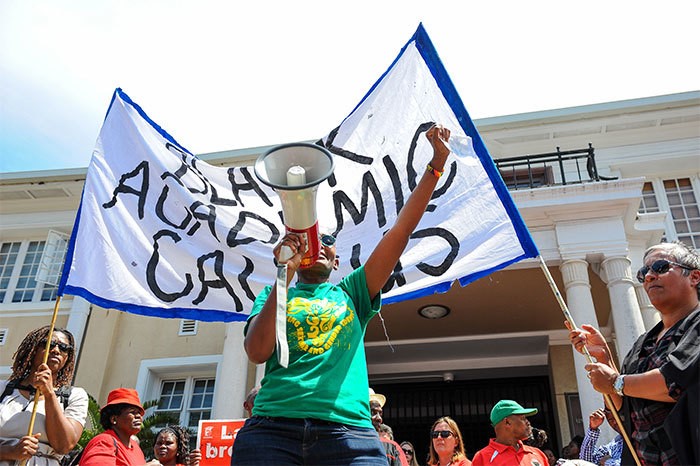
On the 10th of July 2020, the journal did in a special issue publish for the second time the irksome commentary, rebuttals, and the author’s response. By that singular act, the journal arrogated back unto itself the moral right to authorise the concluding word on the contentious debate it had itself triggered – by publishing the disconcerting commentary by the white settler academic. In the editorial, the journal professes its hope that the publication of the special issue will ‘perform an important and useful educational function in universities as well as in our broader society’. It is the framing of this claim by the white editor, Jane Carruthers, and white chair of the editorial advisory board, Johann Mouton (both of whom had sanctioned the publication of the original racist article) that I find suggestive. Both were the originary cause of the problem, but without a whimper, thought of themselves competent to determine the solution, and to deliver the address to society as to what ‘constitutes an important and useful educational function in universities as well as in our broader society’. The confidence of a white settler is a phenomenon students of politics are yet to study critically. Alas, the special edition did indeed serve an educational function – an unintended educational function, to be more exact. It is the unintended lessons the special edition holds for us, the Black colonised, that I wish to discourse about with you for a moment. To begin with, of the twelve short pieces published as responses to the white settler academic’s original commentary, none was from ab initio prepared for the journal. Virtually all of them had been published elsewhere – some after having been previously refused by the same journal. In a sense then the only original article in the special issue is Nicoli Nattrass’s response titled; ‘In Defense of Exploratory Research: A Reply to Critics’. It is 36 pages long. One will be pardoned to surmise that Nicoli Nattrass had a blank cheque from the editor - no word limit was set for her. What the journal in effect did was to gather in one publication as many of the critiques that had already been published elsewhere, and then accord Nicoli Nattrass unfettered space to take a potshot at them. Noticeably, Nicoli Nattrass’s 36 pages-long reply to critics is placed at the end of the issue, rendering it implausible for her critics to speak back. In the staged encounter with her critics, it is she who has the privilege of uttering the last word. And that privilege, the benefit of delivering the last address, she uses to good effect, at times ridiculing her critics. “[I] can do little about the offence that my Commentary might have caused other than to record my regret that it did so. But I can and do defend my exploratory research and published Commentary as acceptable social science.” At other moments, there is a belittling of the academic gravitas of their arguments; “[I]t is possible that some of my critics are working with a notion of materialism that is embodied in Madonna’s 1984 hit ‘material girl’”. The whole paper is peppered with such condescending statements. Anyone who disagreed, it would seem, did so because they did not understand the profundity and complexity of the argument, the use to which specific formulations we put, the meaning attached to concepts, and the methods used. Ought we to be confounded? No. Because, long ago we had learnt from Edward Said that ‘writing itself is a systematic conversion of the power relationship...into mere written words’. To which the only response, I suggest, can only be that responsibility calls on us to fashion forms of intellection that are adequate to the complexity of the challenges of our time.
But there is something else we learn from the whole manoeuvre that the publication of the special issue represents. Any initiate into Research Methods or Philosophy of Science learns early on that the supposed superiority of the method of the natural sciences, adopted by the social sciences at the moment of the positivistic turn, is that it allows the bifurcation of scientific statements and conclusions into either truth or falsity. At the close of any scientific procedure, statements or conclusions are either verified or falsified. However, in juxtaposing the original offensive commentary and rebuttals, with the response from Nicoli Nattrass, the journal successfully creates an equivalence in scientific validity between the two viewpoints. Put differently, with the publication of the special issue in which both viewpoints are accorded the same scientific and ethical currency, with none being judged at the end as ethically and/or scientifically lacking, the journal editor skillfully headed readers into a hermeneutic circle – to borrow and stretch at the same time a concept from the philosophy of science. The reader is, as it were, left with a choice to decide which way, he/she is swayed by the arguments, like a shopper decides at the mall whether to buy cigarettes or a book – both of which equally compete for his/her consideration – because the capitalist has certified them both with the same fetish of a commodity. Of the ninety articles I reviewed, only one refuses the lure of the journal’s hermeneutic circle (I admit I may have missed others). Not included in the special issue, it is penned by Keymanthri Moodley. The crux of its argument is summed in the title; ‘Nattrass’s article should be retracted rather than debated’.
At the end of the article, one is also impelled to inquire into the moral complicity of the Academy’s membership. Of the 572 members/fellows of the Academy of Science of South Africa, we do not know what proportion is constituted by Black South Africans. That, however, does not make the gravity of the moral riddle that confronts them any less weighty. If being conscientious retains any meaning, ought they not reflect on what meaning their continued membership of the Academy portends, for their sense of self-regard and will to be free? Can they retain any claim to self-respect, whilst they continue to be members of an Academy that conspicuously displays its disdain for them? What good is their membership of an Academy that is impervious to the sensibilities of their people, the Black colonised? As they contemplate this moral dilemma, may the lesson James Baldwin imparted to us Black people decades ago be their compass; ‘the measure of one’s dignity depends on one’s estimate of oneself’.
To stage an equivalence in ethical as well as scientific validity, between the white settler academic’s offensive commentary and its critiques (as the special issue of the journal does), is bound to trigger amongst the Black colonised a sense of dis-ease. It leaves the matter unresolved, the dismay and anger lingering. It is precisely this orchestrated failure to settle the matter within the framework provided for by the modern tradition of scientific thought… that legitimises the turn toward bureaucratic processes for a resolution. In so far as those who have been quick to decry the loss or suppression of academic freedom at UCT are sworn to the vocation of scientific knowledge production, they are duplicitous. The gravest danger to the free pursuit of scientific thought, they ought to know, begins when the scientific community condones and protects unethical scientific conduct – because those implicated are white and enjoy like them a privileged position in the country’s knowledge industry. Nonetheless, I am not convinced that a bureaucratic approach will help us resolve what is at the core an intellectual problem, a problem that belongs squarely in the domain of scientific thought. Nicoli Nattrass may be dismissed from the university – she deserves no less – but will that change how, in South African scientific thought, Black people are integrated, thought of, written about and reproduced as objects and/or curiosities, onto which the light of reason is shone always by a white settler subject? No. The problem is bigger, or exceeds the white settler academic’s commentary. The commentary in question is symptomatic of something larger, benefits from an existing repertoire, and draws on an extensive register of meanings. That we failed to correctly diagnose it, is mainly because we have generalised it, thought of it as a generic problem of racism within modern western scientific thought. What such an approach glosses over is the fact that the problem has its South African specificity. In the paragraphs below, I propose an alternative set of intellectual resources with which to apprehend this complex, in a manner that allows us to circumnavigate the trap of the hermeneutic circle, as well as the lure of the bureaucratic solution.
My proposition is in no way meant to obviate the grave fact that the white settler academic Nicoli Nattrass broke all the research ethics protocols, which guide the conduct of research involving human subjects at the University of Cape Town. I can only illustrate with a few examples, from her long list of near criminal transgressions. We do for instance know, that in her Ethics Clearance Application lodged on the 27th of March 2019, she expressly states that, prior to the commencement of the research, permission will be sought from the Director of Student Affairs – as it is required for all research done on/involving UCT students. She did not. We do also know that, in the informed consent form included in her ethics clearance application, there is no allusion whatsoever to any intent to use the data collected to determine why students may be less likely to consider studying biological sciences; just as there is no mention whatsoever of the fact that the data collected will be analysed to determine race-based differences on the above. In effect, students who consented to participating in the research did so under a wrong pretext. What they consented to participating in is a study about their views on rats, starlings, animal welfare and environmental priorities. The consent statement reads; “This survey explores student attitudes and desired policies towards redwing starlings and rodents at UCT as well as their views about animal welfare, preferences and attitudes towards social and environmental priorities…” It is glaringly obvious that what the students did not consent to is a study that seeks their views (as Black South Africans) on their reasons for choosing (or not) to study biological sciences. We do yet again know that material differences exist between the questionnaire submitted and approved by the appropriate ethics committee, and the one ultimately administered. A total of 13 questions were not included in the original questionnaire approved, neither was there an application for variation or amendment of the study design. This breach becomes even more disturbing when one realises that it is precisely the questions that were omitted that enable the white settler academic to make the rather disturbing claims she makes about Black people. The list of transgressions is endless. It will not advance thought to dwell on them. At this point it is more apposite to turn our attention to crafting an alternative, more productive framing of the problem.
Since the onset of the modern Cartesian philosophical tradition there has been a supposition – ontological belief says Charles Taylor – that all aspects of life must be available for explanation and understanding using modern categories. And this effort at comprehending reality – by forcing it to conform to categories that have nothing to do with reality itself but are entirely a product of modern consciousness, is what we call science – the Enlightenment legacy of inquiry. This modern tradition of scientific thought, which has consciousness as the originary source of all knowledge, intermittently runs to ground. More aptly, from time to time it runs into an epistemological predicament. Cognisant of the perennial tendency of modern scientific thought to run into an epistemological predicament, Hoxie Fairchild warns us in his book, The Noble Savage: A Study in Romantic Naturalism that, ‘in research, unless we are very careful, we always find what we are seeking’. He was right, philosophers, travellers, literary scholars and anthropologists sought and found the noble savage – revelled in their discovery, and were honoured for it – even though we know that the noble savage does not exist, and has never existed, at least not in this world.
Now we turn to the first exemplary moment of what I have referred to as the epistemological predicament. Not many centuries ago, science gave us the figure of the Jew, in fact science insisted a universal Jewish biological figure existed. Hereditary biology listed amongst its somatic features: curly hair, dark curly beard, thick lips, protruding ears, and a big nose. Within science, eugenics specifically, also originated the claim that Jews are of such inferior and faulty genetic make-up such that if allowed to live, science believed, they would corrupt the genetic purity of the entire white race. In his book Portrait of a Jew, Memmi writes that, at a sociogenic level, science propagated a motley of traits it collectively referred to as Jewish tendencies. Stekel refers to the same collective habits of thought and behaviour as the ‘Jewish complex’. At the core of Jewish tendencies or the Jewish character is love for profit/tase for money. Add to that boundless ambition, preference for round gold-rimmed spectacles, and a predisposition towards the following professions: law, banking, and being jewelers. Memmi sums up the essence of this Jewish complex best when he writes that it is as though Jews ‘come into the world with a special love of money, and fully equipped to satisfy it’. This science-supported portrait of the Jewish character led us to believe, continues Memmi, that,
“[W]herever money circulates, wherever money is being made, there you will find Jews. In business, naturally, in banks, in industry, in the most lucrative liberal professions. Jews abound in positions as middle-men. They have the necessary patience and the shrewdness for these jobs…”
Indeed, Fairchild was correct, ‘in research, unless we are very careful, we always find what we are seeking’. The anti-Semite initiated, announced, and validated these claims in science – backed by science. And by the scientific community of his or her respective country, evidence suggests. A logical question to pose is; against this backdrop, is it conceivable today, for a non-Jewish academic to conduct an opportunistic study at UCT wherein Jewish students are asked if their choice of law, business, banking and finance related disciplines has anything to do with Jewish eagerness for gain or love for money? Surely if Nicoli Nattrass’s commentary is an example of science, if the bounds of science drawn by her defenders be the standard, such a study ought to be defensible as science. After all, there is a close semblance between the Black South African student in Nattrass’s study and the Jew as constructed by the anti-Semite – they are both driven by materialist considerations. But the answer must be an emphatic No! To pose and answer the why question will be to get ahead of ourselves. However, what we are now able to know and state with certainty is that, just as it is the anti-Semite who creates the Jew, it is the white settler who creates the Black student in said commentary. The question above, as to why such a hypothetical study on the relationship between attitudes of Jewish students towards money and their choice of what discipline(s) to study is not conceivable (note I did not say possible but conceivable) and is bound up with yet another – what changed in the situation of the Jew, that has not changed in the situation of the Black South African? Is it bureaucratic interventions, law and other forms of interdiction that catalysed such change?
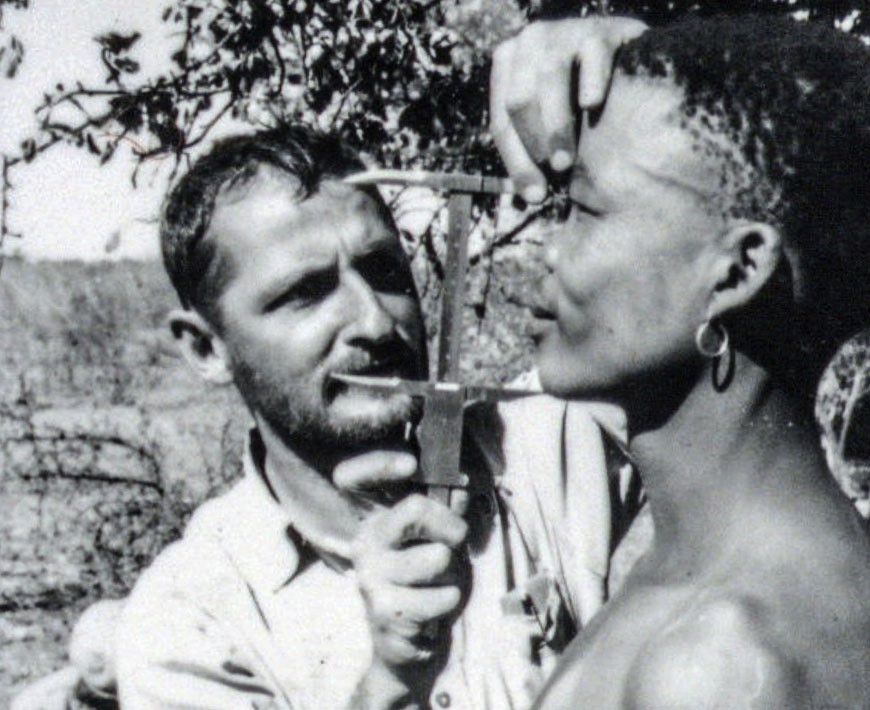
We turn at this point to the second exemplary moment of the epistemological predicament, in the long list of many that dot the history of modern scientific thought. If the first exemplary moment brought us the figure of the Jew, the second gives us the figure of the Afrikaner. If the first ended in the Holocaust, the second ends in thousands of Afrikaner men, women and children perishing in British concentration camps, during the Anglo-Boer War. If the Jew was a function of the anti-Semite, the Afrikaner is a product of the mind of an English scholar. To be exact, the resultant figure of the Afrikaner is a product of a long scholarly investment within South African social sciences, by English scholars, beginning with John Barrow’s in the book, An Account of Travels into the Interior of Southern Africa in the Years 1797 and 1798. This obsession with the Afrikaner, or observable need to construct and reproduce in social scientific thought an image of the Afrikaner, is carried forth by John Phillip in the 1820s, W.M. Macmillan and his student De Kiewiet in the 1920s/30s. In sum, an image of the Afrikaners that emerges from South African social scientific thought is that of a phlegmatic, indolent, unintelligent, and backward people, completely lacking in creative and moral sentiment, and given to sensual pleasure. ‘Rude and uncultivated as are their minds’ writes Barrow when talking about Afrikaner lack of sophistication. When describing their indolence, he writes, ‘[B]y indolent habits, excess of food, and fondness for indulging in sleep, they become no less gross in their persons, than vulgar in their manners’. But he was not done yet as he claims, thus day after day,
‘The lazy glutton safe at home will keep’,
Indulge his sloth, and fatten with his sleep’.
The highpoint in this body of social scientific thought is the insistence on the synonymity between being Afrikaner and having an uncultivated mind, no taste for the arts, no interest in intellectual pursuits, no moral sensibilities, and failure to appreciate both labour and industry as virtues. Again, it is to Burrow, the best representative of the tradition, that we must turn, as he enlightens us at length about what science had found to be the true character of the Afrikaner (men, women and children);
‘Unwilling to work, and unable to think; with a mind disengaged from every sort of care and reflection, indulging to excess in the gratification of every sensual appetite, the African peasant grows to an unwieldly size…The women of the African peasantry pass a life of the most listless inactivity. The mistress of the family, with her coffee-pot constantly boiling before her on a small table, seems fixed to her chair like a piece of furniture… The young girls sit with their hands before them as listless as their mothers. Most of them… can neither read nor write, so that they have no mental resources whatsoever… To the cold phlegmatic temper and inactive way of life may perhaps be owing the prolific tendency of all the African peasantry. Six or seven children in a family are considered as very few; from a dozen to twenty are not uncommon…”
For us the Black colonized in South Africa, the morale of this exemplary moment is best framed into a question; is it conceivable at UCT today, for an English academic to opportunistically survey Afrikaner students asking them whether the paucity of Afrikaner academics at UCT is a function of the disdain Afrikaners have for thinking? One is impelled to conclude again that if Nicoli Nattrass’s study is an example of science, and the meaning of academic freedom defended by Herman Giliomee and Andre du Toit were the standard, such a hypothetical study would be scientific and legitimate. But we do know, like Giliomee and du Toit, that such a hypothetical study is well-nigh inconceivable (not impossible but inconceivable). Why? Better put, if so, a logical question must be what changed in the situation of the Afrikaner that has not changed in the situation of the Black South African? Similarly, is it bureaucratic interventions, law and other forms of interdiction that were the cause for such change?
We have been long, but I must plead for the indulgence of the reader. If it is any comfort, we have arrived at the point where we can attend to the why question – why a hypothetical study on Jewish or Afrikaner students is inconceivable in South Africa today, whereas the one on Black South African students by a white settler academic is not only conceivable, but judged to be morally and ethically defensible? The intent, ultimately, as we answer the question, is to excavate the necessary theoretical resources with which to apprehend this complex, in its totality and not as an event. Ngugi, after all, warns us with typical sagacity to look not (to the event) where we tripped and fell, but where the rain began to beat us. Our effort at the theoretical elucidation of the question, it bears stating, is a simplified re-statement of Charles Taylor’s complex exposition of the process of scientific meaning-making in his book; Philosophy and the Human Sciences, Vol 2. In it, we learn that the constitution of any scientific project or conduct of any scientific study does not begin with settling on one set of hypothetical questions against another, or formulating preferred research questions. What precedes this is the participation of the researcher in the constitution and reproduction of his/her society’s intersubjective meanings, social practices underlined by implicit norms, and a constitutive language of social life. The necessity of an intersubjective meaning (ways of experiencing reality) that is commonly shared arises out of recognition that there is no autonomous social reality ‘which can be discovered in each society and which might exist quite independently of the vocabulary of that society’. Structures of social reality, social practices and experiential meaning are not universal – they are specific to each society. We learn further that the vocabulary societies use to access their social reality and practices is not just descriptive of reality, but rather constitutive of the same range of social practices. Between the society’s range of social practices and its language of social life, a mutually constitutive relationship prevails. Explaining the dialectic between the language of social life and social reality, Taylor writes, ‘… what this points up is the artificiality of the distinction between social reality and the language of description of that social reality. The language is constitutive of the reality, is essential to its being the kind of reality it is.’
If this sounds abstract, we need only return to the commentary penned by the white settler academic at UCT, to render it concrete. To start with, Nicoli Nattrass claims to be explaining a problem which she projects as being external to herself, and to the commentary itself. On the contrary, we know that, because the modern tradition of scientific thought depends on the modern subject as the originary source of all knowledge, there is no structure of meaning that is external to or independent of the modern subject’s interpretation and/or consciousness. Even what scientists present as objective facts begin their life as subjective facts in the consciousness of a modern subject. Thus, the slander the white settler academic presents as scientific facts/conclusions begins life as subjective facts, in her white modern consciousness. Relatedly, as Taylor points out, language is essential to constituting reality. Thus, for the practice of excluding Black South Africans in the biological sciences and the academy generally to be rationalisable/rendered comprehensible, which is to say possible, it requires a language, a range of meanings established and accepted as appropriate for engaging with it or talking about it, i.e. they prefer to go and work. Because social practices, including the one of excluding Black South Africans from the academy, are in part constituted by certain ways of talking about them, when Nicoli Nattrass sponsors a new language of describing the practice of excluding Black people in the academy (that moves away from history of white settler colonialism and settles on personal choice/agency that is conditioned by the experience of ownership or lack thereof of pets), she is engaged in the process of constituting reality into being the kind of reality it is. Wherein the white settler cannot be held responsible for constituting the Black South African in the same way that the anti-Semite is held responsible for constituting the Jew.
Social practices, like racism, even when universal, develop in each society their own specificity. Their particularity is not only in the language with which they are made sense of, which is equally constitutive of them, not only in how they are experienced and felt, but also in what Taylor calls implicit norms. For instance, in a society with hierarchical relations of power which correspond with a hierarchical structure of races, like South Africa, social practices which sustain these hierarchically-structured relations require a unique set of underlying etiquette – implicit norms. These implicit norms remain opaque to an outsider, because open to him or her is a different structure of experiential meaning and a different set of implicit norms. To comprehend this, we need only realise that, for their existence and efficacy, norms which are constitutive of social relations and practices are not contingent upon individual predilections, ideological outlook, or professed commitment/orientation. Rather, these norms implicit in societal practices, as Taylor explains, ‘are not just in the minds of the actors but are out there in the practices themselves, practices which cannot be conceived as a set of individual actions, but which are essentially modes of social relation...’ It will help to demonstrate, but the evidence must this time come from a different but related set of events at UCT. When three DVCs – two of them white, one coloured, and an Indian COO decide to constitute themselves into a clique, undermine the authority of a Black (female) Vice-Chancellor by, amongst other things; insisting that she should not individually meet with Deans of Faculties, and finalising (against university protocol) appointments of white over Black professors without her signature, constituting themselves into an unauthorised university structure by publishing together a DVCs Desk secular that excludes the VC, and insisting before Council on continuing to function as a clique that has no regard for authority of both the Black Vice-Chancellor and Council, what they in effect are doing is to enact the societal etiquette (or obey implicit societal norms) which sustain hierarchically-structured race relations among white – coloured – Indian and Black South Africans at the bottom. It matters not, tells us Taylor remember, what individual beliefs and attitudes people profess – their actions are a function of a constitutive set of norms in which individuals find themselves, and act.
Would for instance such an alliance between three DVCs – two of them white, one coloured, and an Indian COO have been conceivable against a white VC? Perhaps a more appropriate way of posing the question is; would the norms constitutive of race relations and other social practices in which hierarchically-structured interactions are realised in South Africa have permitted such an alliance? No! Similarly, when Nicoli Nattrass opts to study or talk about Black South Africans in such a condescending language, what must change is not just her individual behaviour. More fundamentally, it is the implicit norms that govern or determine what is possible to say and do, in relation to Black people if you are white, Indian or coloured. In short, it is the inter-subjective meanings – ‘ways of experiencing action in society which are expressed in the language, descriptions and implicit norms constitutive of institutions and practices’ – that are in the present at the base of the South African society, which have to be fashioned anew (italics mine). This is precisely what Jews and Afrikaners did successfully – engineer a new set of inter-subjective meanings for society, wherein the constitutive language of social life and societal etiquette render it inconceivable for the anti-Semite and the English respectively to study them as objects of contempt, ridicule, derision and scorn. And this is precisely what we as Black South Africans have failed to do.
Inter-subjective meanings are best thought of as society’s collective imaginary; collectively produced, sustained, and owned. As such, inter-subjective meanings do not issue from a voluntary joining together of individuated subjective attitudes and sensibilities. Rather, they constitute a common background, and common frame of reference – what phenomenologists call the habitual background. Such cannot be individually owned but is always already in the common world. A pertinent question to ask then is, who in South Africa today has the responsibility for or is allowed a right to participate in the determination of society’s inter-subjective meanings? If society’s social imaginary is collectively produced and sustained, who is included and excluded from the bounds of this collective? Here I suspect is where we ought to look, for it is where the rain began to beat us. When we do, it will become evident that, twenty-five years after independence, Black people remain excluded from the circuits of knowledge and cultural production in South Africa. Similarly, we have as a logical consequence no role in the determination of our own society’s inter-subjective meanings, and its implicit norms constitutive of social practices. Unlike Afrikaners, whose first demand, following their exclusion by the English, and the Jews, whose first demand following their denigration by the anti-Semites, was to become integral in society’s constitution of its new social imaginary, its inter-subjective meanings, we the Black colonised have on the contrary been content to uphold, sustain and live under a societal frame of reference that is antithetical to our desire to be human. Bureaucratic processes and interventions on their own cannot change inter-subjective meanings and implicit norms underlying social practices. It is our exclusion in the academy, which is simultaneously our exclusion from the collective determination of society’s inter-subjective meanings, that ought to be our object of revolt and demand – not dubious self-interested bourgeois politics of transformation.
We have been long and so must bring this conversation to a close. Perhaps the best way to end is by drawing a parallel between the publication of Nicoli Nattrass’s commentary, and the slander in the white press of UCT’s Black Vice-Chancellor. If our exposition above has any theoretical traction, then the two developments which ensued around the same time are not joined merely in time. Readable in both are the same underlying assumptions and pre-conceived ideas – about the Black as always lacking, deficient and less than the norm or standard. They are both symptomatic of the same malaise. Importantly, they issue from the same originary source – the contempt shown always by white settlers to Black South Africans, a contempt rendered possible and legitimised by the prevalent inter-subjective meanings, and constitutive language of social life and societal etiquette to whose collective constitution we are barred as Black South Africans. Correctly so, we diagnosed the insult in the white settler academic’s commentary to be directed at Black people generally. We must in the same vein recognise that the object of insult in the white media campaign was never the VC in her person, but the generality of Black people. In the white gaze, we shall do well to recall, all Black people are substitutable. For those Black people given to the habit individualising Black misfortune until it is their turn to suffer the affliction of whiteness, the reflex is to refuse implication in the debacle. To reiterate, if the commentary by the white settler academic triggered our collective outrage as Black people, the libel against a Black VC (mounted in the main by white people) deserves our collective anger as Black South Africans.
In the long weeks of July 2020, a slew of newspaper articles published by the white press fanned a tendentious claim about the VC’s personality, meant to cast doubt on her capability to lead the institution. In telling the tale, many others in the white press spoke of a problem foretold. They all began the tell-tale by claiming the problems with her persona had been flagged during the appointment process. Tell-tales, when narrated in full, carry a morale for society. But when told in part, with deliberate omissions, they become lies. The fabrication about a Black person’s deficient behavioural traits is a well-worn out strategy in the history of colonial thought and practice. This one nonetheless has its own specificity, which the white press elected to hide. They hid the fact that, everywhere in the colonial world, white people always arrogate unto themselves the right to decide for the whole of society what is in the best interest of the public. They omitted to inform the public that, in accord with this self-given right, white people had long decided for society that the then DVC: Research, now VC, not be appointed. To actualise their nefarious aims, they orchestrated a fable about her personality. In the lead this campaign had a long-serving white member of council, a former white VC, and one of the current DVCs – who then approached (amongst others) executive directors of units that reported to the then DVC: Research – to write to the selection panel with a concocted story about her personality. The conscientious among the executive directors refused the invitation. The white press omitted this detail from its narration. Why, we do not know.
In the next issue of the Commandante Speaks we will report with more detail on how, having failed at the selection committee, after creating a fictional personality problem, the campaign (led in the main by white people, in alliance with Indian and coloured people) in various senior administrative positions from HR to Finance, changed tact. With the brazenness afforded them by society’s inter-subjective meanings and implicit norms, they assured anyone who cared to listen that they would work the Black VC out of her position within six months. Indeed, they did engage in practices aimed at achieving their goal, including using the Ombud as the noose. Does it not strike the reader that, coincidentally, the newspaper articles questioning the VC’s ability to lead were almost all published in the week of the 10th to the 19th of July 2020? Does this not suggest a well-orchestrated plan? Does it not strike the reader that the same personality issue, for which a former VC and one of the current DVCs had canvassed support for in the lead to the appointment, surfaces yet again now as part of the so-called Ombud Report? Could we possibly read this as an attempt to harvest an old investment? The steps taken by the Chair of Council, in handling the fallout subsequent to the publication of an unsanctioned Ombud Report, and the earnestness with which they are undertaken, are an unmistakable sign of impeccable leadership. May you not dither nor be distracted by people like us. However, responsibility calls on us to inform the Chair that, in the grand scheme of the plot, the Ombud is a minor act. At the core of the plot is the determination of an alliance led by three DVCs, two white, one coloured and an Indian COO, supported by certain white and Indian members of council, to frustrate and eventually unseat a Black VC. We need not remind the Chair that, despised by white people, Malcom X was shot by a Black person.
We the Black people, because of a white-constructed inter-subjective meaning-world, have had to endure life in an intolerable situation. It has been intolerable for long, for 368 years. However, white people ought to know that, like the slaves of Haiti did, we pray for a day in the future when in us will develop the courage to dare everything, and to watch the nightmare begin again with the shoe on the other foot.
I Remain
Commandante Lushaba
‘I am sure of Allah’s favour on us’

